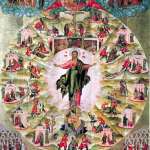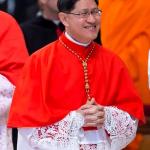Today is the Feast Day of Thomas Aquinas, and by extension of all theologians. Since I already wrote about what Aquinas was up to, as a very amateur theologian, I thought I’d write a bit–very roughly–about how I see theology and the role of theology.
A great start might be the phrase “Fides Quaerens Intellectum”, faith seeking understanding, Anselm’s motto, which was quickly expanded to all of Scholasticism. I heard on an Eastern Orthodox podcast that this represented a fundamentally new attitude in theology, a rationalizing spirit that sought to reduce the living myserium fidei to a set of abstract, systematic propositions. Nothing could be further from the truth, and the Church Fathers–as anyone who has read them can attest–very much practiced Fides Quaerens Intellectum.
The point is that it is faith seeking understanding: we will never reach full understanding of the divine mystery, even on the other side of the Eschaton (which is why it will never be boring). But we are endowed with faculties of reason, and these faculties of reason are not only a part of our Imago Dei, they are, in fact, a participation in the very divine life, in God’s Logos through whom all things were made and without whom was not anything made that was made. Faith, the encounter with the Incarnate Logos Jesus Christ, summons in us a response of our entire being, which is drawn by grace into the divine embrace, into nuptial union with Christ. Faith seeking understanding, then, is one part of this response of our being that Christ draws to Himself and “makes new.” And we are all called, according to our various gifts, to this adventure of faith seeking understanding; God does not want blind assent any more than he wants burnt offerings; what he wants is for us to have life, and have it to the full, which includes a free (and humble) assent of reason and will to the truths of faith.
Indeed, theology, understood as a specific discipline, is a uniquely Christian undertaking. In the other two “religions of the book”, religious scholars are first and foremost jurists, teachers of the law. Mythology, the telling of the divine stories, which exists in every religion, is not the same thing as this unique, speculative-rational meditation on the divine mystery. And when other traditions have developed a specifically theological tradition, it is often through the influence of the Christian example. N.T. Wright makes a good argument that it is Paul who invented this thing called theology: the New Covenant people will no longer be united by Torah observance, whose constraints and boundary markers served to build up, unite and maintain across generational lines the Jewish people; but instead, the Christians are united by faith, but for this faith to stay alive, the people of God have to actively think and rethink it. In his letters, Paul doesn’t just teach, he doesn’t just argue, he “thinks outloud” for his churches, teaching them not just the content of the faith, but how to do theology.
Hans Urs von Balthasar liked to contrast “sitting theology” and “kneeling theology.” By “sitting theology” he primarily meant the dry Neothomism of the late 18th century and early 20th century of the academic, sitting at his desk, producing abstract propositions and systems that validate the caricature of “rationalistic” Scholasticism. And by “kneeling theology” he meant a theology that is more reverent towards the divine mystery, that retains this aspect of Fides quaerens intellectum that is a living faith. He is certainly right. I would also add that a good theology must also be a “working theology.” (In other words, after Fides quaerens intellectum, Ora et labora might be the theologian’s other motto.) Paul was not a university professor, he was a pastor. He got beaten, he got thrown in jail, he had to work to eat, he sometimes slept on the street. Almost all of the great Church Fathers were bishops, and their theology was enlivened by their everyday experience as pastors. Theology cannot become a self-sufficient intellectual exercise, but rather must always be at the service of the Church and its work of salvation. Karl Barth’s simple dictum that theology is merely an aid to preaching, while a bit simplistic, is a useful reminder for us of two things: (a) that theology needs to stay humble–the Virgin Mary, by and large, does not appear to theologians–; and (b) that theology needs to eventually “cash out” in practical gifts that help the Church do its actual work of serving the poor, healing the sick, feeding the hungry, and lighting the world on fire with the Gospel of Jesus Christ.
Of course, there is so, so much more to say about “theology.” But maybe this is a start.















